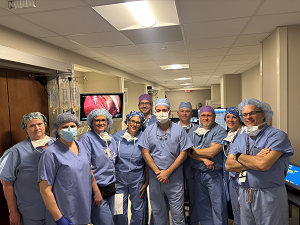Sound Bath and Meditation
Henry Ford Cancer is excited to partner with Detroit health organization The Village Personal Training and Wellness to bring you Sound Bath and...
Mesothelioma is a rare form of cancer that can affect the lungs, chest cavity and abdomen (belly).
While there’s no cure for mesothelioma, our team has the experience to diagnose and manage the disease, even if it has advanced. We’ll help reduce your pain and make you as comfortable as possible.
We also offer a wide range of support services as part of your cancer care, including cancer support groups that let you connect with other people receiving care.
Long-term exposure to asbestos is the main risk factor for mesothelioma. Asbestos is a fire-resistant material that manufacturers once commonly used in insulation, ceiling and roofing vinyl, cement and automotive brake materials. Most people who develop mesothelioma as a result of asbestos exposure do so about 30 years after their exposure.
Other mesothelioma risk factors include gender and age. Men are at higher risk for developing mesothelioma than women, and the average age of someone who has mesothelioma is 60.
Mesothelioma develops slowly. Symptoms of the disease can take 20 to 50 years to appear and often are similar to those of other conditions. These symptoms may include:
While symptoms can develop in the disease’s early stages, people often ignore these symptoms until they worsen. You should see a doctor right away if you experience any of these warning signs. If you have mesothelioma, you may be able to get treatment before it progresses.
Because mesothelioma is so rare, it can be challenging for some healthcare providers to diagnose the disease. Fortunately, our doctors use the most advanced tools and techniques available to diagnose mesothelioma.
Learn more about our mesothelioma diagnosis methods.
Although there’s no cure for mesothelioma, we can manage the disease in most cases. Our management approaches are more effective when we detect and diagnose mesothelioma early in the disease process. In addition, mesothelioma management tends to be more effective at larger cancer centers like Henry Ford Cancer, which sees many cases of this rare disease.
Even if you have advanced mesothelioma, we have options available to help ease your pain, improve your breathing and make you more comfortable. We’ll work to not only prolong your life but also improve your quality of life.
You and your doctor will work together on a personalized treatment plan, along with input from our tumor board, which brings together all our thoracic cancer experts to provide a team-based approach to our care. Your treatment plan may include one or more of the following:
We’re constantly looking for new treatment options for mesothelioma. Our program for thoracic cancer clinical trials is one of the most active in the nation.
By taking part in a clinical trial, you have the chance to try new treatments before they’re widely available elsewhere. You and your doctor can decide whether you’re a good candidate for a clinical trial.
Learn more about our cancer clinical trials and how they work.

Henry Ford Cancer is excited to partner with Detroit health organization The Village Personal Training and Wellness to bring you Sound Bath and...
Join us each Tuesday for Open Studio, a free-of-charge art therapy group available to cancer patients and survivors where you can spend some...
Music has an incredible ability to soothe the mind and lift the spirit. It can ease pain, calm anxiety, and support healing. If you or someone you...
Join us each Tuesday for Open Studio, a free-of-charge art therapy group available to cancer patients and survivors where you can spend some...

DETROIT — Newly published research conducted in Wayne County, Mich. found that non-smokers, particularly women, who lived near textile and...



We use cookies to improve your website experience. By using this site, you agree to our Terms of Use. Read our Internet Privacy Statement to learn what information we collect and how we use it.